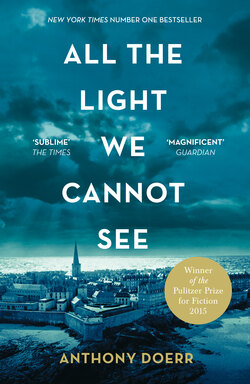Читать книгу All the Light We Cannot See - Anthony Doerr - Страница 34
Good Evening. Or Heil Hitler if You Prefer.
ОглавлениеHis fourteenth birthday arrives in May. It’s 1940 and no one laughs at the Hitler Youth now. Frau Elena prepares a pudding and Jutta wraps a piece of quartz in newspaper and the twins, Hannah and Susanne Gerlitz, march around the room impersonating soldiers. A five-year-old—Rolf Hupfauer—sits in the corner of the sofa, eyelids slipping heavily over his eyes. A new arrival—a baby girl—sits in Jutta’s lap and gums her fingers. Out the window, beyond the curtains, the flame atop the waste stack, high in the distance, flaps and shivers.
The children sing and devour the pudding, Frau Elena says, “Time’s up,” and Werner switches off his receiver. Everyone prays. His whole body feels heavy as he carries the radio up to the dormer. In the alleys, fifteen-year-old boys are making their way toward mine elevators, queuing up with their helmets and lamps outside the gates. He tries to imagine their descent, sporadic and muted lights passing and receding, cables rattling, everyone quiet, sinking down to that permanent darkness where men claw at the earth with a half mile of rock hunched on top of them.
One more year. Then they’ll give him a helmet and lamp and stuff him into a cage with the others.
It has been months since he last heard the Frenchman on the shortwave. A year since he held that water-stained copy of The Principles of Mechanics. Not so long ago he let himself dream of Berlin and its great scientists: Fritz Haber, inventor of fertilizer; Hermann Staudinger, inventor of plastics. Hertz, who made the invisible visible. All the great men doing things out there. I believe in you, Frau Elena used to say. I think you’ll do something great. Now, in his nightmares, he walks the tunnels of the mines. The ceiling is smooth and black; slabs of it descend over him as he treads. The walls splinter; he stoops, crawls. Soon he cannot raise his head, move his arms. The ceiling weighs ten trillion tons; it gives off a permeating cold; it drives his nose into the floor. Just before he wakes, he feels a splintering at the back of his skull.
Rainwater purls from cloud to roof to eave. Werner presses his forehead to the window of the dormer and peers through the drops, the roof below just one among a cluster of wet rooftops, hemmed in by the vast walls of the cokery and smelter and gasworks, the winding tower silhouetted against the sky, mine and mill running on and on, acre after acre, beyond his range of sight, to the villages, the cities, the ever-quickening, ever-expanding machine that is Germany. And a million men ready to set down their lives for it.
Good evening, he thinks. Or heil Hitler. Everyone is choosing the latter.
